Kulathu Lab
Yogesh studied Chemical Engineering in India. For his PhD he worked on B lymphocyte development and signalling at the Max Planck Institute for Immunobiology in Freiburg, Germany in the lab of Michael Reth. He then did his postdoctoral research at the MRC Laboratory of Molecular Biology, Cambridge supported by EMBO and Marie Curie postdoctoral fellowships. He started his own lab at the MRC PPU, University of Dundee in 2013 as a tenure track group leader. He was awarded tenure in 2017 and is a Programme Leader at the MRC PPU. Yogesh is the recipient of an EMBO Young Investigator award and a Lister Prize from the Lister Institute of Preventive Medicine.
Yogesh Kulathu
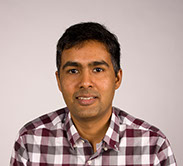
members

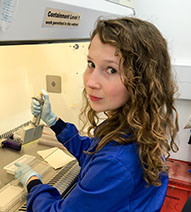
Dominika Kwasna
PhD Student
Dominika graduated in July 2015 with a first class honours BSc and MSc degree in Microbiology from the University of Wroclaw, Poland. During her master’s course she did an internship project in the lab of Professor Michel Ghislain at the Université Catholique de Louvain in Belgium, working on a novel yeast protein involved in ubiquitin-dependent protein degradation. She sought to gain further experience in the field of ubiquitylation and worked in Yogesh Kulathu’s lab as part of an Erasmus programme. In June 2016, she started her PhD in the lab to investigate the role of the ubiquitin system in T-lymphocyte function. She discovered ZUFSP/ZUP1 as a novel family of DUBs and has since been focussed on understanding how ZUP1 works.
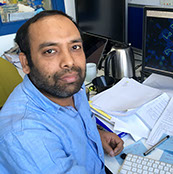
Syed Arif Abdul Rehman
Postdoctoral researcher
Arif has a Bachelor's degree in Chemistry and then did a Master's in Biochemistry. For his PhD he worked in the lab of Prof. Gourinath at the Jawaharlal Nehru University (JNU), New Delhi, India. Arif is interested in protein-protein interactions and macromolecular protein complexes in signal transduction. He joined the lab in April 2014 and is interested in the structural characterization of substrate recognition by Deubiquitinases.
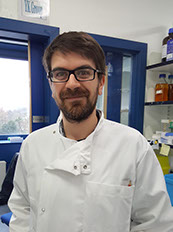
Matthew McFarland
Postdoctoral researcher
Matt is from Aberdeen. He graduated from the University of Aberdeen with a BSc in Biomedical Sciences in 2012, followed by a PhD studying the mRNA translation system of baker’s yeast in 2016. He moved to the University of Nottingham in early 2017, where he investigated the translational control of embryogenesis in fruit flies. He joined the Kulathu lab in January 2019, and is currently interested in understanding the role of MINDY deubiquitinases in yeast.
Outside of the lab, he is a keen(ish) runner and video game aficionado. He is also an occasional stand-up comedian, telling terrible jokes about yeast, flies, and science in general, to anyone who’ll listen.
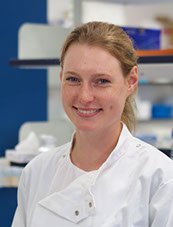
Magdalena Gorka
PhD student, UbiCode ITN network
Magda is from Warsaw, Poland. She graduated from the University of Warsaw with BSc and MSc in Molecular Biotechnology. Her main research interests are cell signalling pathways. During her bachelor studies, she investigated the role of interleukin 4 in adipose cell differentiation. Her master thesis focused on the influence of tyrosine kinase pathway inhibition together with anti-hypertensive drugs on renal cancer. She joined the Kulathu lab in 2018 as a Marie Skłodowska-Curie fellowship PhD student, and she studies how ubiquitin signals regulate protein degradation in different subcellular compartments.
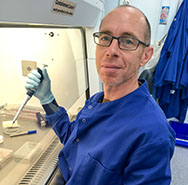
Stephen Mathews
Postdoctoral researcher
Steve graduated from the University of Bristol and subsequently moved to Imperial College London to study mechanisms of pathology during respiratory virus infections for his PhD studies. He carried out postdoctoral training at the University of Dundee where he investigated various aspects of lysosomal function in immune cells. Steve joined the lab in October 2016 and is interested in the regulation of T cells by ubiquitin and ubiquitin-like modifiers.
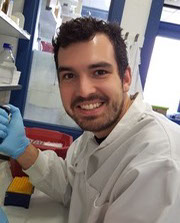
Luuk van der Bekerom
Research assistant
Luuk is from the Netherlands and did his undergraduate at the Fontys Hogeschool and his Master’s studies at the Radboud University both located in the Netherlands. During his Undergraduate and Master’s he completed successful internships at Janssen Pharmaceuticals, Merck and in the lab of Geert van den Bogaart. In this lab he studied the recruitment of NOX2 to phagosomes regulated by SNAREs in dendritic cells. During his Master’s he studied the molecular machinery of autophagosome formation in David McEwan’s lab. Luuk joined the Kulathu lab in March 2018 to work on the cellular regulation of ubiquitin signalling in mammalian cells and yeast.
Outside of the lab, he loves playing and watching football on a regular basis and likes to explore the highlands of Scotland together with his two dogs.
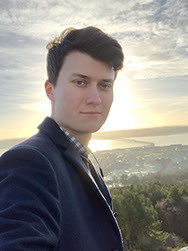
Lee Armstrong
PhD Student
Lee completed my undergraduate degree in biochemistry at The University of Edinburgh in 2017. Lee joined the Kulathu lab in June of 2018 and has been working on understanding how MINDY DUBs recognize substrate. Lee's long-term interests lie in understanding how proteins work at their most fundamental level: "it is only by understanding the mechanism by which proteins work that we can hope to modulate their function".
Lee likes to combine his nerdery with geekery and so outside the lab he enjoys video games and reading, as well as walking and a bit of amateur photography.
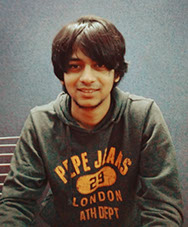
Joshua Peter
PhD Student
Joshua graduated with a B.tech degree from Anna University, Chennai in 2013 and joined IIT Guwahati as a Junior Research Fellow to work on CRISPR/Cas proteins In 2014, he moved to CSIR-Institute of Genomics and Integrative Biology in New Delhi to work with Dr. Kausik Chakraborty and Dr. Koyeli Mapa, on conformational dynamics of molecular chaperones using Single Molecule Spectroscopy. With an aim to understand how ubiquitin signalling regulates proteostasis, Joshua joined Dr. Yogesh Kulathu's lab as a PhD student in Jan 2017.
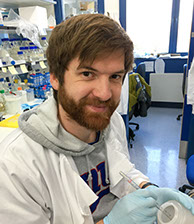
Sven Lange
PhD Student (jointly supervised with Philip Cohen)
Sven obtained B.Sc. and M.Sc. degrees in Biochemistry at the Ruhr-University Bochum, Germany. He carried out his Master’s thesis in the lab of Prof. Alfred Wittinghofer at the Max Planck Institute of Molecular Physiology, Dortmund, Germany, where he focused on the biochemical and structural characterization of proteins associated with the Bardet-Biedl syndrome and ciliary trafficking. Sven is jointly supervised by Philip Cohen and Yogesh Kulathu and started a 4-year Ph.D. in 2015 that is funded by Medical Research Scotland. The aim of his work is exploring IRAK2 and IRAK3 pseudokinases as potential new candidates for drug therapy.